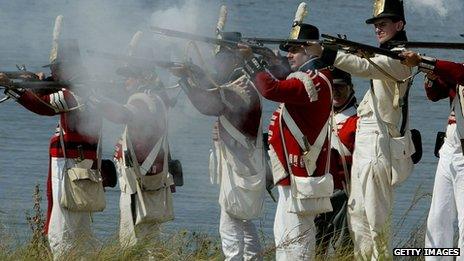Why the War of 1812 still matters
- Published
Alexandra Deutsch, from the Maryland Historical Society, tells the BBC how America got its national anthem
On the bicentennial of America's declaration of war against the United Kingdom, the BBC's Joan Soley says the War of 1812 still resonates today.
If someone stopped you on the street at this exact moment and asked you to explain what the War of 1812 was about, could you explain?
You would not be alone if you couldn't. When asked, my father said: "I have a hunch it involved men in red coats, American Indians and Daniel Day-Lewis." (He had two out of three.)
While generally being relegated to history books and classrooms, the War of 1812, also known as America's second war for independence, was important - and it still matters.
An audacious declaration
Two hundred years ago this Monday, American President James Madison signed a declaration of war against Great Britain.
The first time the United States had declared war against another nation, it was not an action that enjoyed unanimous support in Congress.

Enthusiasts in Maryland reenact a skirmish from the War of 1812
The reasons for war included the British habit of forcing American merchant sailors into the Royal Navy, as well as trade restrictions on the US as a side-effect of Britain's seemingly endless war with France. Another factor was British support for Native Americans as they fought against the US government's westward expansion.
In short, the United States had had enough of British meddling in North America - and for the young nation, national pride was at stake.
So the US went to war, and over the course of the two-and-a-half-year conflict, they fought Canadian colonists, Native American tribes, and the British - an audacious move against the world's largest navy at the time.
From a US perspective, what made the war "important" is readily visible today.
Internally, the American national anthem and flag got their beginnings from the attack on Fort McHenry during the Battle of Baltimore in 1814.
Externally, the mutually beneficial "special relationship" that has grown between Great Britain and the United States since that period developed in the aftermath of the war that pitted those nations against one another.
Star-spangled story
The Battle of Baltimore stands out as a turning point during the War of 1812. Weeks before the attack, the British had burned most of the buildings in Washington, DC - including the White House and the Capitol building.
At Fort McHenry, a few miles to the north, about 1,000 soldiers under the command of Major George Armistead prepared for a British naval attack.
As part of their preparation, they sank some of their own merchant ships near Baltimore Harbour to limit the sailing abilities of their attackers. Once underway, the British naval attack on the fort lasted 25 hours.
But the fort held.
This was an enormous accomplishment, as Alexandra Deutsch from the Maryland Historical Society told me this past week.
Not only was it a crucial military victory, it also helped develop an American anthem: the flag above the fort inspired a lawyer by the name of Francis Scott Key to write a poem in tribute. Set to the tune of an old drinking song, his words became an anthem - The Star-Spangled Banner.
In Baltimore, the War of 1812 still has a special meaning. This year, international ships travelled to the city's port as part of an event called the "Sailabration", which marked Baltimore's place in the war.
During the singing of the national anthem, Martha, an 82-year-old from outside of Baltimore, was visibly moved.
"I feel it every time. I have lived here all my life and I am proud of where I'm from," she says.
"When I see the news and think about everything I've seen in my lifetime, the world is so complicated. But I'm part of something big and bold, and we may not always agree but we are all Americans."
Friendship forged in fire
Speaking volumes about the modern relationship between the US and Great Britain, Prime Minister David Cameron and his wife made their first official foreign trip this year in March, and it was to the United States.
As President Barack Obama joked during his public welcoming remarks: "It's now been 200 years since the British came here to the White House under somewhat different circumstances. They made quite an impression, they really lit up the place!"
Jokes aside, the two countries have come a long way from the War of 1812. Even after the conflict ended, tensions continued between the two nations in the 19th Century, but by the 20th Century they had established a valuable partnership of trust and support.
From the occupation of Europe during World War II to today in Afghanistan, Great Britain and the US tend to globally present a united front.
As Martha from Baltimore said as she watched the anniversary "Sailabration", the world is complicated. Simply put, the importance of an international friendship such as this looks as vital now as it ever was.